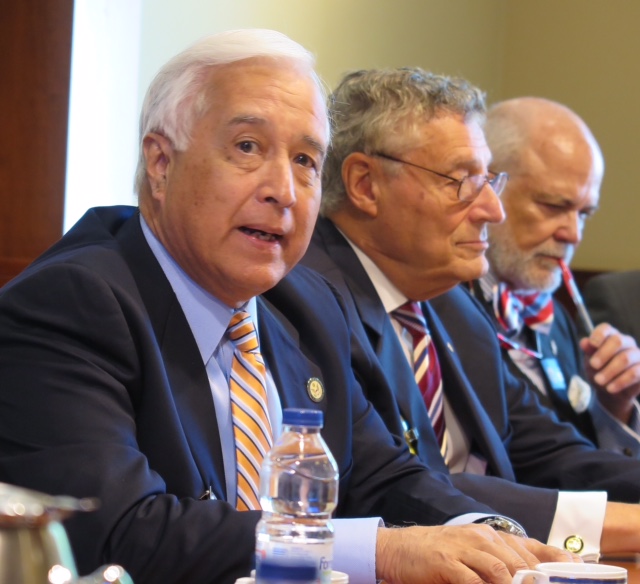Conference in Spain on international criminal law

On September 6, it took place at the USA Embassy in Spain, the conference on international criminal law attended by Judge Edward Prado of the Fifth Circuit of Appeals of the USA, Lawyer of Ohio, Martin Pinales, former president of the National Ass. Criminal Defense Lawyers and by the Madrid Lawyer Gustavo Lopez Muñoz y Larraz, Associate of the Department of Criminal Law and Extraditions of the Firm JL CASAJUANA.
Edward Prado is a federal judge on the US Court of Appeals for the Fifth Circuit, which hears the states of Texas, Louisiana and Mississippi –there are 12 circuits in total-. His circuit is made up of 17 judges, who each month are divided into groups of three different ones to deal with the different cases.
Unlike state judges, who serve four-year terms and are democratically elected, federal judges are appointed for life.
After the intervention of Judge Prado, a colloquium was opened with all those attending the session and Judge Prado answered the various questions that the attendees were formulating.
Various questions were raised regarding whether there is a difference between civil and criminal judges in the US, to which the speaker responded that at the state level there are no specializations, at the state level It depends on the city: if it’s big, there are specialists. At the federal level, there is no distinction, at the state level there are some exceptions such as Texas, where there are two Supreme Courts, one criminal and one civil. Most, including Ohio, only have one Supreme Court.”
There were also questions regarding the independence of judges from the parties that appoint them and whether someone can veto them based on that? Judge Prado commented that the appointment is political, but after being appointed a judge cannot be involved in anything political, he has to watch his friendships, in which organizations he gets involved… I have friends in both parties, but I cannot go to their acts”. “I cannot say that there are no political issues in our decisions, but for example, last week three judges, from different parties, met in the Court of Appeals, and in the 20 cases the three of us agreed,” he continued. “Sometimes very political issues come up, like a law proposed by the Republicans and passed in Texas that required a photo ID to vote. People normally use a driver’s license, but poorer people, who are usually Latino or of color, don’t have it, so a lawsuit was filed saying that the law discriminated against Latinos and people of color.” “In the first instance it was said that it was discriminatory, that it went against the Constitution. The 15 judges of the circuit had to meet, and the result was 9 to 6 in favor of the judgment of the first instance judge. The 6 against were all Republicans, but of the 9 in favor, 6 were Democrats and 3 were Republicans,” he noted. In addition, in the process of appointing federal judges, in the Senate, pressure groups can give their opinion on the candidates. “If a candidate is known for having political positions, it is more difficult for them to be appointed as a judge,” he said. In any case, he said, citizens “have confidence and faith in the system. In the case Bush v. Gore, in the 2004 elections, it was decided by a vote of 5 to 4 that there was no need to repeat the electoral recount in Florida. The 5 votes were Republican and the 4 Democrats: half the nation didn’t like the decision, but they accepted it.”
Was the issue of jurisdictional issues also discussed, specifically whether cases should be heard at the federal or state level? Prado responded that “there has to be a relevant federal law for it to reach federal court. The robbery of a national bank, for example, can be state, because it is a robbery, but also federal. In this case, the state and federal prosecutors -since judges are not instructors in the US system- must agree, and since the rules on evidence are different in both laws, they can opt for that area where they will be easier to plead your cause.”
Going into questions about sanctions for punitive damages, Prado said that “they must be large enough so that the sanctioned person changes his way of acting, but not too much, so that he does not have to close, if it is a company”. There were also questions regarding the teams, to which Prado responded that federal judges, like state ones, have teams of law clerks, who are with them for one or two years. Prado has a team of four of them, which selects “among 500 applications. I have had more than 75 in my career: some are teachers, other judges, other lawyers, prosecutors… one has left the law and produces beer, ”he said, between smiles. Likewise, he commented, the judges have teams of investigators who, once the jury has decided whether the defendant is innocent or guilty, study the life of the convicted person -alcohol problems, drugs, criminal record-, to decide what sentence to impose. The death penalty was the subject of another question, Pinales explained that “it is being eliminated little by little, for various reasons, among others that a death penalty process costs the State 750,000 dollars -a life sentence costs 300,000-, and we would prefer to allocate that money to other purposes, such as schools. In addition, sometimes it is discovered before the execution that the defendant is innocent. Many cases are based on witness statements.”
Pinales and Prado recalled that the vast majority of cases in the US are resolved by agreements between the prosecutor and the defense attorney “The judge he can accept or not the agreements, but since he does not know the prosecutor’s evidence, nor does he know if they are scarce, he almost always ends up accepting them”. In any case, “since the judges are not instructors, criticism when the State loses cases tends to go to the prosecutor.”
There were also questions regarding: Who judges the judges? “In the federal system there is a Council whose number of judges depends on the size of the population of the Circuit Court. The Fifth Circuit is made up of eight trial judges and nine appellate judges. There are other Councils of different sizes,” Prado explained. “Anyone can file a complaint against a judge; it is presented to the president of the council, who is also president of the Circuit Court, and he appoints a commission”. The council decides if the judge is guilty or not, “but you can’t impose a very large sentence on a federal judge, because he is for life. You can receive a private or public reprimand, or a 90-day disqualification, for example; in the most serious cases, an impeachment –removal process-, so that it reaches the US Congress and they throw him out of office”. Also, in Washington D.C. there is a group of judges specialized in ethical issues, to which you can ask questions such as: “I am a member of a club that does not accept people of color…”
Prado, 69, highlighted that at 65 “a judge can retire, receiving the same salary. Why do we stay? Because we like work, responsibility, power, honor.”
14/09/2016



















